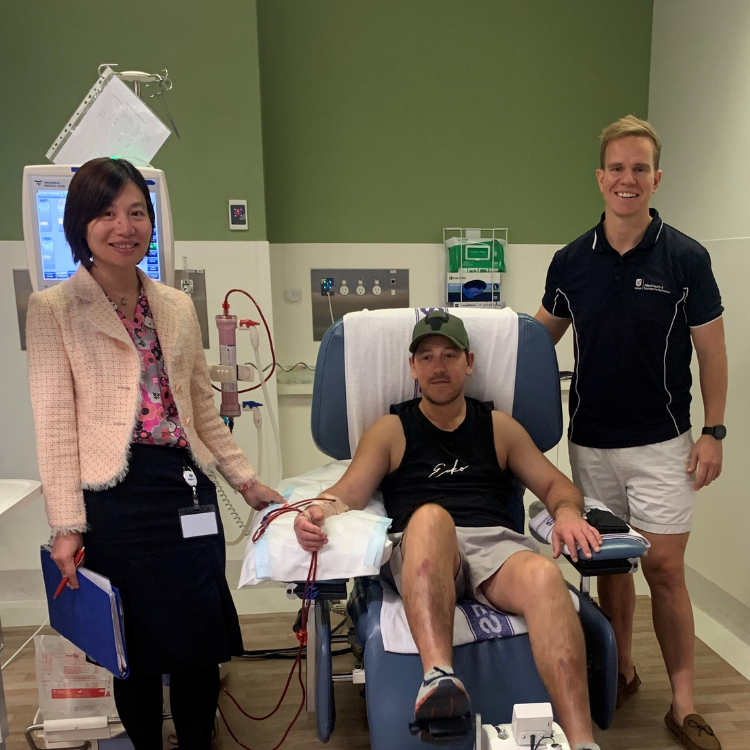Dialysis is a life-saving therapy for patients with kidney disease – but it does come with some side-effects. A new trial is looking at whether cycling during dialysis could prevent an unwanted impact on heart health. Patient Will signed up to be a trial participant at the Royal Adelaide Hospital.
“I’ve been getting regular dialysis for about three years,” says Will.
“Now as part of this trial, I cycle for the first hour of my treatment sessions.”
“If what I’m doing here can help other people, then I’m all for it.”
The research is a collaborative project across CALHN, UniSA, and with international scientists.
Clinical Professor Shilpa Jesudason is nephrologist and head of unit in the Central Northern Adelaide Renal and Transplantation Service at the Royal Adelaide Hospital.

Professor Shilpanjali Jesudason, Central Northern Adelaide Renal and Transplantation Service
“We are very proud to be part of this international clinical trial,” she says.
“Engagement in this sort of research really puts CALHN on the global map as leaders in kidney health.”
How kidney dialysis works
When kidneys are in good health, they filter about half a cup of blood every minute. Filtering by kidneys means waste materials, un-needed salts and minerals, and extra water are removed from blood. These byproducts are stored in the bladder as urine, and then excreted when you go to the toilet.
For people with severe kidney disease, reduced filtering capacity leads to dangerous levels of fluid, electrolytes and waste building up in the body. Symptoms include nausea and vomiting, fatigue, brain fogginess, high blood pressure, shortness of breath and chest pain. Without dialysis, patients with severe kidney disease can die within days to weeks.
Fortunately, haemodialysis – where the blood is filtered through an external machine – can replace some aspects of kidney function.
However, the technology does bring another risk factor into the equation. During haemodialysis, the heart can sometimes be temporarily stressed. This is known as ‘stunning’.
“Heart stunning is a sign of the stress that kidney failure puts on the heart,” says Clinical Professor Shilpa Jesudason.
“Patients on dialysis have much higher rates of heart disease and heart failure than the general population, and we are really interested in finding ways to reduce this impact.”
“Through this trial we aim to find out if a little bit of exercise during dialysis can improve heart function.”
New research to boost impact of dialysis
Exercise physiologist Dr Brett Tarca is lecturer in clinical exercise physiology at UniSA and one of the study leads.
“Across all study sites, we plan to enrol around 160 haemodialysis patients to look at the impact of 12 weeks of cycling on occurrence of heart stunning and related health impacts,” says Brett.
“We’ll measure the extent of stunning, brain cognition, symptoms such as fatigue, exercise capacity and the ability of patients to engage in physical activity outside of the dialysis sessions.”
The multinational research team will collect data from Will and other study participants over the long- and short-term.

Dr Brett Tarca is Lecturer, Clinical Exercise Physiology, UniSA
A new normal
CALHN provides dialysis for more than 1000 patients every year – including Will.
“My kidney health has really had a major impact on how I live,” says Will, who is aged 38.
After years of declining kidney health linked with type I diabetes, he started dialysis in 2022.
“I had to learn to live a new way, without my kidneys doing their usual job.”
Will has experienced nerve pain, physical challenges, and feeling sluggish and tired due to kidney disease.
“It had a big impact on my mental health too, as it shifted what I was able to do in terms of work and exercise” he says.
Happily, Will has now settled in a new routine that incorporates his thrice-weekly dialysis sessions. He is employed in construction and enjoys working out regularly at the gym.
Perhaps Will’s participation in this trial will lead to even better health for dialysis patients in the future.
The research is a collaborative project across CALHN (Renal Clinical trials, Cardiology Echocardiography team), UniSA (exercise physiology), and with international scientists (University of Manitoba, funded by a major grant from the Canadian National Institute of Health, lead Investigator Prof Clara Bohm). And thanks to the broader team who were instrumental in getting this project off the ground, including Prof Paul Bennett, Jing Zhang, Bronwyn Hockley, Richard Le Leu and Dr Mitra Shirazi.
Clinical Professor Shilpa Jesudason is nephrologist and head of unit in the Central Northern Adelaide Renal and Transplantation Service at the Royal Adelaide Hospital and is the site Principal Investigator.



